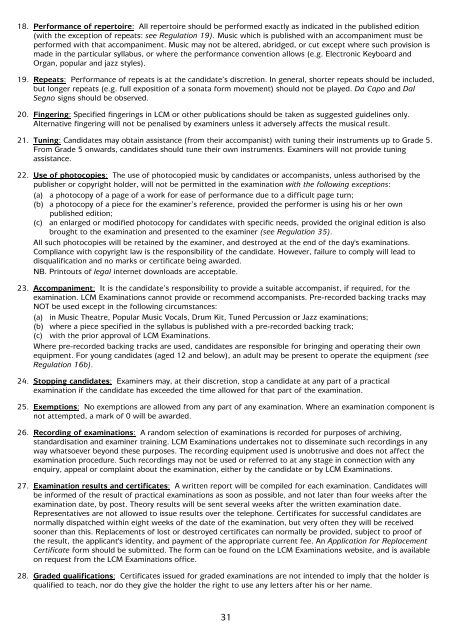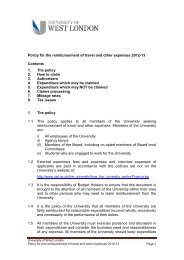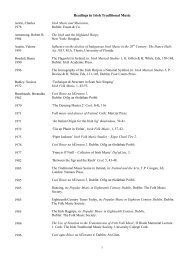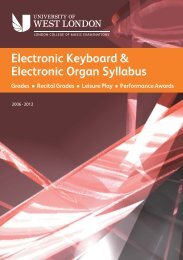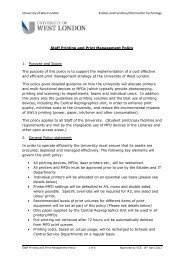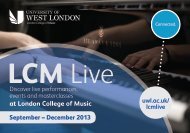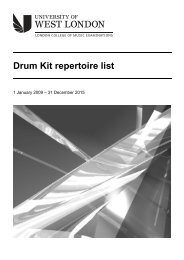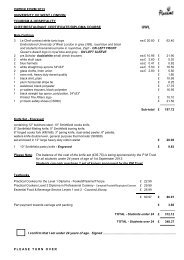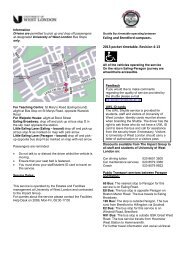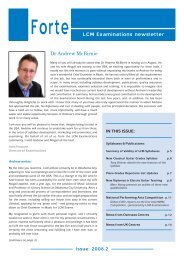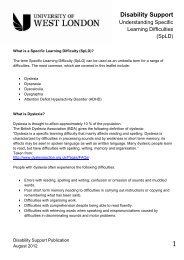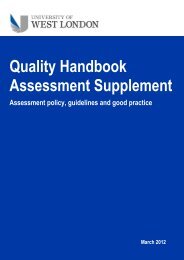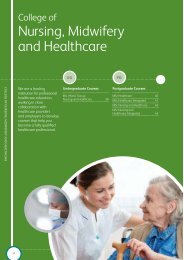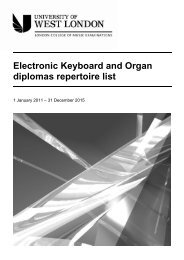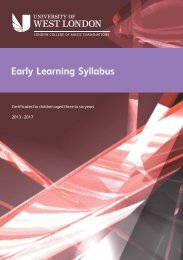LCM Exams - Church Music Diplomas - University of West London
LCM Exams - Church Music Diplomas - University of West London
LCM Exams - Church Music Diplomas - University of West London
- No tags were found...
You also want an ePaper? Increase the reach of your titles
YUMPU automatically turns print PDFs into web optimized ePapers that Google loves.
18. Performance <strong>of</strong> repertoire: All repertoire should be performed exactly as indicated in the published edition(with the exception <strong>of</strong> repeats: see Regulation 19). <strong>Music</strong> which is published with an accompaniment must beperformed with that accompaniment. <strong>Music</strong> may not be altered, abridged, or cut except where such provision ismade in the particular syllabus, or where the performance convention allows (e.g. Electronic Keyboard andOrgan, popular and jazz styles).19. Repeats: Performance <strong>of</strong> repeats is at the candidate’s discretion. In general, shorter repeats should be included,but longer repeats (e.g. full exposition <strong>of</strong> a sonata form movement) should not be played. Da Capo and DalSegno signs should be observed.20. Fingering: Specified fingerings in <strong>LCM</strong> or other publications should be taken as suggested guidelines only.Alternative fingering will not be penalised by examiners unless it adversely affects the musical result.21. Tuning: Candidates may obtain assistance (from their accompanist) with tuning their instruments up to Grade 5.From Grade 5 onwards, candidates should tune their own instruments. Examiners will not provide tuningassistance.22. Use <strong>of</strong> photocopies: The use <strong>of</strong> photocopied music by candidates or accompanists, unless authorised by thepublisher or copyright holder, will not be permitted in the examination with the following exceptions:(a) a photocopy <strong>of</strong> a page <strong>of</strong> a work for ease <strong>of</strong> performance due to a difficult page turn;(b) a photocopy <strong>of</strong> a piece for the examiner’s reference, provided the performer is using his or her ownpublished edition;(c) an enlarged or modified photocopy for candidates with specific needs, provided the original edition is alsobrought to the examination and presented to the examiner (see Regulation 35).All such photocopies will be retained by the examiner, and destroyed at the end <strong>of</strong> the day's examinations.Compliance with copyright law is the responsibility <strong>of</strong> the candidate. However, failure to comply will lead todisqualification and no marks or certificate being awarded.NB. Printouts <strong>of</strong> legal internet downloads are acceptable.23. Accompaniment: It is the candidate’s responsibility to provide a suitable accompanist, if required, for theexamination. <strong>LCM</strong> Examinations cannot provide or recommend accompanists. Pre-recorded backing tracks mayNOT be used except in the following circumstances:(a) in <strong>Music</strong> Theatre, Popular <strong>Music</strong> Vocals, Drum Kit, Tuned Percussion or Jazz examinations;(b) where a piece specified in the syllabus is published with a pre-recorded backing track;(c) with the prior approval <strong>of</strong> <strong>LCM</strong> Examinations.Where pre-recorded backing tracks are used, candidates are responsible for bringing and operating their ownequipment. For young candidates (aged 12 and below), an adult may be present to operate the equipment (seeRegulation 16b).24. Stopping candidates: Examiners may, at their discretion, stop a candidate at any part <strong>of</strong> a practicalexamination if the candidate has exceeded the time allowed for that part <strong>of</strong> the examination.25. Exemptions: No exemptions are allowed from any part <strong>of</strong> any examination. Where an examination component isnot attempted, a mark <strong>of</strong> 0 will be awarded.26. Recording <strong>of</strong> examinations: A random selection <strong>of</strong> examinations is recorded for purposes <strong>of</strong> archiving,standardisation and examiner training. <strong>LCM</strong> Examinations undertakes not to disseminate such recordings in anyway whatsoever beyond these purposes. The recording equipment used is unobtrusive and does not affect theexamination procedure. Such recordings may not be used or referred to at any stage in connection with anyenquiry, appeal or complaint about the examination, either by the candidate or by <strong>LCM</strong> Examinations.27. Examination results and certificates: A written report will be compiled for each examination. Candidates willbe informed <strong>of</strong> the result <strong>of</strong> practical examinations as soon as possible, and not later than four weeks after theexamination date, by post. Theory results will be sent several weeks after the written examination date.Representatives are not allowed to issue results over the telephone. Certificates for successful candidates arenormally dispatched within eight weeks <strong>of</strong> the date <strong>of</strong> the examination, but very <strong>of</strong>ten they will be receivedsooner than this. Replacements <strong>of</strong> lost or destroyed certificates can normally be provided, subject to pro<strong>of</strong> <strong>of</strong>the result, the applicant's identity, and payment <strong>of</strong> the appropriate current fee. An Application for ReplacementCertificate form should be submitted. The form can be found on the <strong>LCM</strong> Examinations website, and is availableon request from the <strong>LCM</strong> Examinations <strong>of</strong>fice.28. Graded qualifications: Certificates issued for graded examinations are not intended to imply that the holder isqualified to teach, nor do they give the holder the right to use any letters after his or her name.31


